Experiences
Video: The Work of a EoC Family Business for Environmental Protection
EoC entrepreneurs John and Julie Mundell have been working to protect the environment for more than 25 years. Their company, Mundell and Associates, began by working to address environmental damage and problems caused by toxic waste in Indianapolis, IN.
Today, their work is known throughout the United States and many other countries. Working to preserve the earth is a calling for them to build unity and a response to protect our planet for generations to come.
Learn more about their experience in this video by CSC Audiovisivi.

Video: Economy of Communion Business Network Growing in New York
The Economy of Communion in North America held its first of a series of bi-monthly meetings in 2021 on January 16.
Paul Catipon, President of Netpro Communication, an innovative and rapidly growing full-service IT consulting firm based in New York City, shared how the inclusive business practices inspired by the Economy of Communion (EoC) are put in practice by a growing number of businesses and people in the city.
Catipon says: “Instead of running the EoC principles by myself, can we involve other companies?” He then explained the network of relationships formed and the various initiatives that became the answer to that question.
The meeting agenda also included a reflection on the meaning of ‘poverty’ in the EoC, a few experiences from current and former entrepreneurs, as well as introductions to ‘The Economy of Francesco‘ and ‘The Hearth of a Human Family’, of which the EoC is a contributing partner.
Video of ‘Business Practices of the EoC’ panel at St. Bonaventure University now available
“This was the best presentation about business ethics I have seen in my four years here. It was realistic.” (student)
“I thought that today’s panel presentation was very well done, and exactly the kind of perspective to which we should be exposing our students. It was right on in terms of our mission: Developing responsible leaders for the greater good and the bottom line.” (faculty)
These were some of the impressions from the circa 150 students and professors of St. Bonaventure University that attended the panel discussion on ‘the Business Practices of the Economy of Communion’ on April 6th, 2017.
If you didn’t get to go and want to watch it, you can access the video via this link.

You can review the agenda and the profile of the speakers here, as well as pictures from the event.
Changing the Economy is Possible: Hope in Action
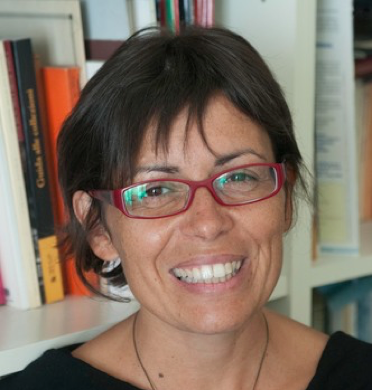 By Maddie Maltese
By Maddie Maltese
At the University of Saint Thomas in St. Paul, MN, entrepreneurs, economists, business people and students from North America and Cameroon design new models of leadership and business inspired by the principles of the Economy of Communion (EoC).
 There are some conventions that you attend out of duty and some with brilliant speakers that enchant an audience. And then there are gatherings that might not draw large numbers or are not widely advertised, but change your way of thinking and acting because the agenda is founded in real life stories and reflections, full of conversation about how social justice and business go hand in hand. I attended one such gathering June 9-12 at St. Thomas University in St. Paul, MN, and experienced that change is possible, desired, and shared by many; by a billionaire as much as by a business professor, by a priest heading an entrepreneurial university and by students that have left their country for an internship in businesses animated by economic principles founded in communion.
There are some conventions that you attend out of duty and some with brilliant speakers that enchant an audience. And then there are gatherings that might not draw large numbers or are not widely advertised, but change your way of thinking and acting because the agenda is founded in real life stories and reflections, full of conversation about how social justice and business go hand in hand. I attended one such gathering June 9-12 at St. Thomas University in St. Paul, MN, and experienced that change is possible, desired, and shared by many; by a billionaire as much as by a business professor, by a priest heading an entrepreneurial university and by students that have left their country for an internship in businesses animated by economic principles founded in communion.
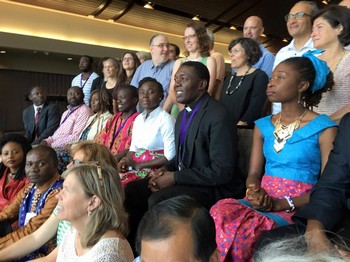 Among the participants at the 2016 North American Economy of Communion gathering were a group of academics from the Catholic University Institute di Buea (CUIB) in Cameroon. This university, which was founded in 2010 to foster entrepreneurship inspired by the principles of the EoC, already counts 2000 students. You’d expect classrooms, offices, laboratories and big screens. Instead, the university is made up of seven round ‘villages’; cement platforms where the pillars support a tin roof that hosts students across the schools of engineering, organic agriculture, economics and computer science. Father George, the president of the University explains that the “poor in developing countries are not objects in need of aid but subjects of change. We have wasted time accusing industrialized countries or in judging ourselves. Instead, our energies should be channeled into a true development of our communities, where the environment, business, spirituality and culture coexist side by side and develop businesses, schools, and community services. No student of the CUIB graduates without spending weekends over the course of a year volunteering and launching an entrepreneurial endeavor in their home community. The secret of CUIB’s success lies in the 30 minutes a day dedicated to Mass for Christians, in the prayer for Muslims, and in a time of spiritual reflection for the others. Without values you cannot provide direction to change.”
Among the participants at the 2016 North American Economy of Communion gathering were a group of academics from the Catholic University Institute di Buea (CUIB) in Cameroon. This university, which was founded in 2010 to foster entrepreneurship inspired by the principles of the EoC, already counts 2000 students. You’d expect classrooms, offices, laboratories and big screens. Instead, the university is made up of seven round ‘villages’; cement platforms where the pillars support a tin roof that hosts students across the schools of engineering, organic agriculture, economics and computer science. Father George, the president of the University explains that the “poor in developing countries are not objects in need of aid but subjects of change. We have wasted time accusing industrialized countries or in judging ourselves. Instead, our energies should be channeled into a true development of our communities, where the environment, business, spirituality and culture coexist side by side and develop businesses, schools, and community services. No student of the CUIB graduates without spending weekends over the course of a year volunteering and launching an entrepreneurial endeavor in their home community. The secret of CUIB’s success lies in the 30 minutes a day dedicated to Mass for Christians, in the prayer for Muslims, and in a time of spiritual reflection for the others. Without values you cannot provide direction to change.”
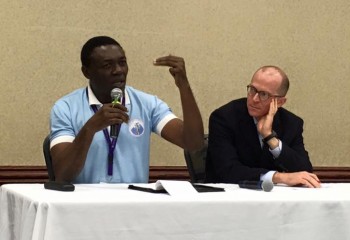 Poverty, Inc., a documentary that was presented at the EoC meeting by its director Michael Matheson Miller, challenged the work of humanitarian organizations that operate with paternalistic assistance in poor countries and that do not produce desired development outcomes. Examples include indiscriminate shipments of food in parts of Asia and Africa that cripple local agricultural production and alter the diet of entire villages as well as donations of clothing that can lead to crisis in local textile industries. “There have been two possible ways to act in humanitarian interventions: give people fish or teach people how to fish. Today, the developmental model must be one of ‘fishing together’. In other words, ‘fish with the other’ and listen to the real needs of the people, without out-of-context interventions that can cause unintended damage”, commented Miller. He encouraged the adoption of the EoC paradigm for development projects.
Poverty, Inc., a documentary that was presented at the EoC meeting by its director Michael Matheson Miller, challenged the work of humanitarian organizations that operate with paternalistic assistance in poor countries and that do not produce desired development outcomes. Examples include indiscriminate shipments of food in parts of Asia and Africa that cripple local agricultural production and alter the diet of entire villages as well as donations of clothing that can lead to crisis in local textile industries. “There have been two possible ways to act in humanitarian interventions: give people fish or teach people how to fish. Today, the developmental model must be one of ‘fishing together’. In other words, ‘fish with the other’ and listen to the real needs of the people, without out-of-context interventions that can cause unintended damage”, commented Miller. He encouraged the adoption of the EoC paradigm for development projects.
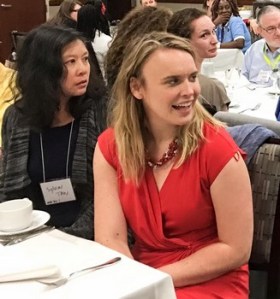 The EoC demands a new form of leadership, one that is capable of combining market expertise, innovation and care for others. A workshop led by Jim Funk, a management consultant, included role plays on how to solve complex conflicts within business organizations by applying the ethics of communion in which both management and employees are fully appreciated for their talents, intuitions, and ideas that can help the business and the person grow in a logic of shared social justice.
The EoC demands a new form of leadership, one that is capable of combining market expertise, innovation and care for others. A workshop led by Jim Funk, a management consultant, included role plays on how to solve complex conflicts within business organizations by applying the ethics of communion in which both management and employees are fully appreciated for their talents, intuitions, and ideas that can help the business and the person grow in a logic of shared social justice.
The experiences of various entrepreneurs and managers, who opened up and shared both successes and failures at the meeting, were key to demonstrating that change is a door through which one can see that even mistakes can lead to progress. In the entrepreneurial logic of the EoC, successes and failures can become opportunities to innovate and change.
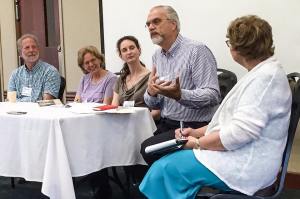 This was demonstrated by the experiences of Anne Godbout, founder of a travel agency that specializes in pilgrimages and spiritual journeys; of Emery Koenig, who led hundreds of managers at a large global firm; of John Mundell, owner and CEO of an environmental services company who has succeeded in combining business, well-being and care of the environment. This very theme, addressed by the recent papal encyclical Laudato sì, was at the center of another presentation. The candid discussion that ensued reflected how little attention is paid to concrete action we can take individually and collectively to address environmental concerns and safeguard creation.
This was demonstrated by the experiences of Anne Godbout, founder of a travel agency that specializes in pilgrimages and spiritual journeys; of Emery Koenig, who led hundreds of managers at a large global firm; of John Mundell, owner and CEO of an environmental services company who has succeeded in combining business, well-being and care of the environment. This very theme, addressed by the recent papal encyclical Laudato sì, was at the center of another presentation. The candid discussion that ensued reflected how little attention is paid to concrete action we can take individually and collectively to address environmental concerns and safeguard creation.
The story of Robert Ouimet, a successful Canadian entrepreneur in charge of a global food company, was particularly moving. When Ouimet met Mother Theresa in 1983, he offered to give awa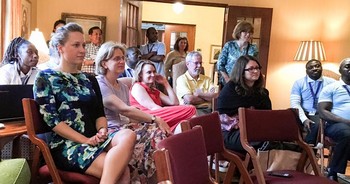 y all of his goods for a social cause. The saint of Calcutta answered that he didn’t possess anything, rather that everything was lent to him and that his life needed to be at the service of his family, of his employees and of the environment, following the life style proposed by the Gospel. His human and financial capital were gifts received by God to be shared and put to good use. The choice to follow her words has not been without pain as his children and his financial backers did not always understand his decisions. Ouimet’s journey gave birth to a set of nine core business principles that guide his entrepreneurial actions. For example, one principle is to “Meet with terminated employees twice within six months following the termination”. Putting it into practice requires courage and readiness for emotional interactions. Ouimet stated, “I had to do it, because I wanted the persons to feel that, despite the reasons that led to the termination, I continued to value them, and that I would have helped them to find a path or occupation more suited to their talents. In all these years, only two persons refused to meet with me.”
y all of his goods for a social cause. The saint of Calcutta answered that he didn’t possess anything, rather that everything was lent to him and that his life needed to be at the service of his family, of his employees and of the environment, following the life style proposed by the Gospel. His human and financial capital were gifts received by God to be shared and put to good use. The choice to follow her words has not been without pain as his children and his financial backers did not always understand his decisions. Ouimet’s journey gave birth to a set of nine core business principles that guide his entrepreneurial actions. For example, one principle is to “Meet with terminated employees twice within six months following the termination”. Putting it into practice requires courage and readiness for emotional interactions. Ouimet stated, “I had to do it, because I wanted the persons to feel that, despite the reasons that led to the termination, I continued to value them, and that I would have helped them to find a path or occupation more suited to their talents. In all these years, only two persons refused to meet with me.”
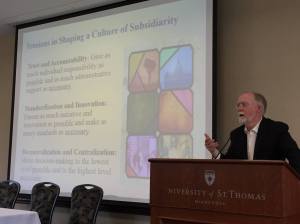 Prof. Michael Naughton, director of the Center of Catholic Studies at the University of Saint Thomas, and Prof. John Gallagher, who teaches management at Maryville College, analyzed the cultural underpinnings of economic actions driven by communion. Naughton underlined that the principle of subsidiarity embodies the logic of gift; that every member of a business brings their gifts to the productive process and thereby produce not only products but also build community and hope. Gallagher confirmed the need for a new anthropology and of prophetic voices in the economic arena that can take risks in the name of hope and a sense of responsibility for future generations.
Prof. Michael Naughton, director of the Center of Catholic Studies at the University of Saint Thomas, and Prof. John Gallagher, who teaches management at Maryville College, analyzed the cultural underpinnings of economic actions driven by communion. Naughton underlined that the principle of subsidiarity embodies the logic of gift; that every member of a business brings their gifts to the productive process and thereby produce not only products but also build community and hope. Gallagher confirmed the need for a new anthropology and of prophetic voices in the economic arena that can take risks in the name of hope and a sense of responsibility for future generations.
The economy of communion and its 25 years if history show that Chiara Lubich’s vision on the role business could play in connecting with people in need, encouraging a life of communion, now has solid roots in North America. Profit at all cost is not the sole motivator for all business activity. Many entrepreneurs, such as those involved with the EoC, are chasing a bigger vision made up of the gifts each person has to offer, putting hope for a better tomorrow into action.

Experiences: Letting Go
 My name is Nick Sanna and I have been involved with the EoC here in North America since 2005, when I was invited to one of their annual meetings. Anne Godbout, in sharing her recent experience as an EoC entrepreneur, asked me to share one of mine.
My name is Nick Sanna and I have been involved with the EoC here in North America since 2005, when I was invited to one of their annual meetings. Anne Godbout, in sharing her recent experience as an EoC entrepreneur, asked me to share one of mine.
Typically, one would recount the experience of how a new business came about, but this time I feel that I should share my experience of last year, where I let go of the business that I was leading.
I was interviewing a possible new recruit, when I realized that I had lost the passion for the business. For the first time, I had to ‘force’ myself to come up with arguments to make the opportunity look attractive to the candidate, as if I were an outside recruiter versus the CEO of the company.
This was unlike other inevitable moments of crisis that I had encountered during my 12 years with the company. Those were growth crises, that helped me realize that we had reached a plateau in our company growth and that we needed to challenge our status quo to find new and better ways to reach the next level.
This time it was different. Something had to change in my life, on the personal and family front as well on the professional side. Not sometime in the future, but at this very moment of my life.
 My wife had been talking about wanting to go back to work, to feel an active part of the community and not to lose touch with her culture (she’s French) for a few years now. I had been supportive in words and intent, but suddenly I realized that this had to become our decision, not just her decision, and that I needed to make time to be with her for that. My oldest son would soon go to college and suddenly I realized how many family moments I had sacrificed because of professional ‘obligations’.
My wife had been talking about wanting to go back to work, to feel an active part of the community and not to lose touch with her culture (she’s French) for a few years now. I had been supportive in words and intent, but suddenly I realized that this had to become our decision, not just her decision, and that I needed to make time to be with her for that. My oldest son would soon go to college and suddenly I realized how many family moments I had sacrificed because of professional ‘obligations’.
At work, we were faced with important decisions such as re-writing our software product to expand our addressable market. I had lost my drive and felt that it would be wrong to continue just because I had a good position and salary and came to the conclusion that it would be best to come up with a transition plan, pass the baton back to the company founder and take some time off.
My wife understood that I wanted to make this change for good reasons and was supportive throughout, but nervous nonetheless. My children were hoping that I knew what I was doing and that things would turn out for the best. My friends of the Focolare had been good listeners along the way and encouraged me to go ahead. I was turning to God frequently. I wanted to do all this for Him and to be a better husband and father. I was asking Him to guide me along the way and I confess that there have been moments were I doubted and felt as if He was not there. What would follow was unscripted.

Brainstorming with my wife Corinne led to her realization that she didn’t want to go back to her old line of work (she’s a Computer Science Engineer) and that she might have a knack for teaching to teenagers… A year and a half later, she managed to complete her teaching degree and she is now happily teaching French language and culture in a new local high school. Without me re-taking my fair share of home tasks like cooking, washing, looking over the children and just being there for her, that wouldn’t have happened. I didn’t realize how demanding teaching is, but I have not seen her this happy since we moved to the DC area.
“Really?”. This was my oldest son’s reaction when I accepted his request to play a part in his film club’s new short movie, Escape. I must have said no too many times before. We had a blast shooting it and being part of this project with his friends. Also, the trips to visit colleges together allowed for much needed quality discussion time. To top the summer off, learning how to kite-board with the boys while enduring many crashes, salt-water drinking and muscle sourness strangely felt like a big reward.
For years I had been complaining about the spoiling of our kids as we lived in a privileged suburban environment. As I was out of a job and living off a separation agreement and no immediate job prospect, we had to pay closer attention to our expenses and live a bit more simply. For the first time in years, a ‘no’ to a certain expense or activity was assumed by all as a family, including the children. The children internalized that extras are not a given and started managing their budget much more carefully, incl. looking for discounts or selling items they were no longer using.
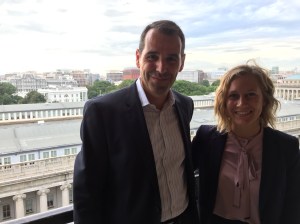
On the professional side, I am now a partner in RiskLens, a software start-up that quantifies cyber security risk. This too, has been a providential development as the job appears to be better tailored to my skills and aspirations than my previous role. One of my colleagues is also involved with the EoC, which helps us to look at every tasks through the lens of the culture of giving, to continuously re-focus on what matters and to achieve a better balance with our lives outside of work.
There would be many more episodes to share but I hope that these few provide a glimpse into our dynamics of this past year and a half. This Thanksgiving weekend in the US appears to be very fitting for sharing this experience, as my heart overflows with gratitude to God for giving me the courage to ‘let go’ and follow Him in this phase of my life.
… As for the next experience, I would like to hear from another EoC member and video producer: Edward Roy…
Experiences: Relocating to a New Office, Together
 My name is Anne Godbout and I started Spiritours, a tour operator specialized in spiritual journeys and pilgrimages, in 2003, as an EoC business.
My name is Anne Godbout and I started Spiritours, a tour operator specialized in spiritual journeys and pilgrimages, in 2003, as an EoC business.
Before the end of last year, we had to find a new office space as our lease ended December 1st, 2014. I gave birth to my first born in May 2014 and was on maternity leave. Up until October I found very little time and energy to visit office spaces for rent with my little one, therefore employees started to worry since I hadn’t confirmed anything… I started doing more visits, then rumors started to go around in the office that I was looking for a space close to my house and some employees didn’t like this idea because it was far from their home.
 I was actually looking for a location near my house (and close to a subway station), but I was also looking in different areas of the city, including the area where our office was at the time. My assistant convinced me I should come and speak with the employees to clarify things. At first I didn’t want to consult them because I thought i would become an endless debate since each probably had their own criterias and priorities.
I was actually looking for a location near my house (and close to a subway station), but I was also looking in different areas of the city, including the area where our office was at the time. My assistant convinced me I should come and speak with the employees to clarify things. At first I didn’t want to consult them because I thought i would become an endless debate since each probably had their own criterias and priorities.
However, because she asked me, and I knew she was doing it for the best interest of everyone, I scheduled an appointment and took the time to prepare a power point with pictures of the top 5 spaces I had found and details on where it was located, how far it was from a subway station, the office layout plan…
 Before I showed them the power point, I asked them to fill a short survey (individually) to know what their priorities were. I explained to them I didn’t want a debate nor a vote, but wanted them to be able to express what they thought was the most important and give them an idea of the options we had. At the end I asked them by email to tell me what were their top 3 places among the options we had and why; this helped me know what they really thought.
Before I showed them the power point, I asked them to fill a short survey (individually) to know what their priorities were. I explained to them I didn’t want a debate nor a vote, but wanted them to be able to express what they thought was the most important and give them an idea of the options we had. At the end I asked them by email to tell me what were their top 3 places among the options we had and why; this helped me know what they really thought.
My first choice would have been an office close to my house that was brand new, but I had to give it up, because it was the most infamous for its location, so I picked my second choice which was the first choice of most employees, even though it needed important renovations. I negociated the terms with the owner and got him to take care of some renovations that he started almost right away since we only had about one month left to prepare everything…
 I hired a general contractor and a decorator for the renovations I had to take care of. They all did such a great job and respected the delays. There were so many things to do, I didn’t know how I was going to manage with the baby, daycare in Montreal is hard to find, there are long waiting lists and my baby was only 6 month old. I remembered my neighbor had a home daycare, so I asked if she had space and if she could take my baby part time, she had one space open, so she accepted right away, that was for me a manifestation of God’s love for us.
I hired a general contractor and a decorator for the renovations I had to take care of. They all did such a great job and respected the delays. There were so many things to do, I didn’t know how I was going to manage with the baby, daycare in Montreal is hard to find, there are long waiting lists and my baby was only 6 month old. I remembered my neighbor had a home daycare, so I asked if she had space and if she could take my baby part time, she had one space open, so she accepted right away, that was for me a manifestation of God’s love for us.
We managed to do everything on time. When the moving company finished to pack their truck with our boxes, we hurried to the new office and I surprised them with a beautifully decorated reception hall with new sofas and… pizza! We had a lot of fun together that day, we goofed around and ended the day with some beers, feeling exhausted but proud and very happy.
One thing my employees didn’t like about the former place was the layout, they were 4 in one office and 3 in the other one and when they were all on the phone at the same time, it was hard for them to concentrate, so they liked the idea of individual offices in the new space, but at the same time they feared to be isolated from the rest of the team and lose the family spirit, so I arranged it with the owner to make openings the size of a window between some offices so they could see and talk to their team partners and exchange files (they work in pairs). We also have lots of communal spaces like the kitchen, the living room, the welcome hall and the meeting room where we can meet and chat to keep building relationships everyday. We even have an oasis of silence (prayer room).
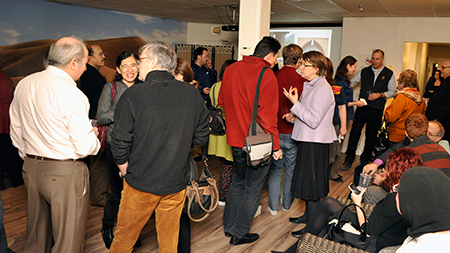 The next Monday after the moving, each employee found a little cactus in bloom and a welcome note handwritten from their boss on their desk.
The next Monday after the moving, each employee found a little cactus in bloom and a welcome note handwritten from their boss on their desk.
I keep hearing from the employees that they really like the new office and I can feel the atmosphere is very positive! We did the inauguration in February and a priest who leads pilgrimages for Spiritours blessed our new headquarter. They even talked about this event in the medias.
Next I want to hear an experience from Nick Sanna…
My Experience with the Company Cube™ at Faraday Elementary School
By Van Bensett, Project Director, vanb@lifedirections.org, 773.663.7597
 LD started its Peer Mentor Program at Faraday Elementary School through unexpected circumstances. On March 18th, LD was poised to begin its Peer Motivation Program at Marshall High School, but the school was hit with a “double whammy.” Chicago Public Schools determined that it would have to administer the federally mandated Partnership for Assessment of Readiness for College and Careers Test, adding a new layer of testing to a complex system of tests already mandated by CPS, the State of Illinois, and college admissions.
LD started its Peer Mentor Program at Faraday Elementary School through unexpected circumstances. On March 18th, LD was poised to begin its Peer Motivation Program at Marshall High School, but the school was hit with a “double whammy.” Chicago Public Schools determined that it would have to administer the federally mandated Partnership for Assessment of Readiness for College and Careers Test, adding a new layer of testing to a complex system of tests already mandated by CPS, the State of Illinois, and college admissions.
On March 13th, I went to Marshall to meet with teachers to select students for the program. Instead, at the entrance stood a crowd of television cameras, news reporters, police, school security and students. The media needed to film reactions to the sports brawl and suspensions at both schools. School security stood at the doorway. No media or visitors without a prior appointment approved by the principal would be admitted. The mayoral campaign was in full swing. The school was in crisis control. When I met with the principal it was clear that LD would not be able to do Peer Motivation that semester. “Testing is our priority. Call us in June; Freshman Connections could be a possibility.”
With this in mind, I scheduled a meeting with the dean of students at an elementary school located directly behind Marshall. We agreed to a partnership. On April 15th Life Directions initiated groups with 8th graders at Faraday Elementary School. Three adult mentors helped to facilitate three groups with twenty-nine students. We used Focolare cubes at the beginning of each group activity to select a positive value to live that day, especially during group interactions.
Our first discovery was that 8th graders prefer the Company Cube over the Cube of Peace. This was interesting in itself since the Cube of Peace was developed especially for elementary school classrooms:
“The Cube of Peace systematically teaches students and adults to focus on the positive: to respect differences, overcome difficulties and solve problems. Those who use the Cube build a sense of community within their educational setting that increases self-esteem and respect for others who are different from them. Incidents of bullying and behavior problems decrease, and students become more mindful and reflective of their behavior. It fosters an environment that maximizes learning and helps students become co-builders of peace.”[1]
For the 8th graders at Faraday it felt a little contrived. Anti-bullying language is part of the discipline code, special non-academic programs, and hallway “advertising.” So when the Cube was rolled to “Treat each person with respect” our classroom comedian rose to the occasion. Using his best “Euro-American therapist’s voice” he parroted the “right” response. “We need to respect ourselves then we will know how to respect others.” His classmates giggled. His answer was intended for the adults in the room, not for himself or his peers.
The next week I had an inspiration. I had been studying the Company Cube for a presentation to adults as a “new way of doing business.” The light bulb went off. What if I used the Company Cube with the 8th graders? Many were already interested in applying for “apprenticeships” with After School Matters. Others had been part of sports teams. Some were even interested in being entrepreneurs. The Company Cube may have been developed to ignite the “new small business revolution,” but I could see it working equally as well with middle and high school students.
At the beginning of the next session I introduced the Company Cube. “I know you are interested in jobs. I also know that many of you have already learned to be team players. So I brought something new for today. It’s the Company Cube, designed by a businessman and used by companies that desire excellence in persons for the good of all. If each person can fulfil his or her potential the results ripple into the wider world, interweaving interpersonal relationships that “see” the good in everyone. Its six values are simple. If you practice them they will help you to find a job and keep a job. The key values are (1) BUILD relationships every day (2) SHARE expertise, time, yourself (3) FIRST to help others (4) SUPPORT with actions, not just words (5) VALUE every person, every idea and (6) COMPETITORS can be friends too.”
Before the groups started, a student would roll the Company Cube. Another volunteered to read from the worksheet.[2] In turn, facilitators encouraged their students to live it in the present moment, and challenged those not keeping the value in their interactions. Repetition and examples helped to teach the values. When one group rolled “FIRST to help others” and reported back “Some of us might not have jobs this summer. But each of us can be the ‘FIRST to help others.’ So our group named two people we could help and how we could help them” I knew we were on to something. The groups were listening and answering for themselves!
On the last day of our program, Paulina Sennett of Ideal Safety Communications, an Economy of Communion company joined us. She shared how the Cube had helped her company and made a presentation on the importance of job safety for teens. Her experiences gave life to the discussion. Near the end of our time together, Paulina asked, “What can you do to make sure you are never fired from your job?”
“Work hard.”
“Be on time”
“Do what you’re told!” they said in rapid succession.
In the back of the room, ever so slowly, one of Chicago’s best basketball prospects raised his hand. “We can start our own businesses” he said softly, not quite sure of his answer.
Paulina beamed, “You’re exactly right!” Now it was his turn to beam so pleased to have the right answer be his.
[1] The Cube of Peace: A Teaching Tool that Reduces Bullying and Promotes Unity, p. 3.
[2] The Company Cube: The New Small Business Revolution (2013) pp. 3-4.

